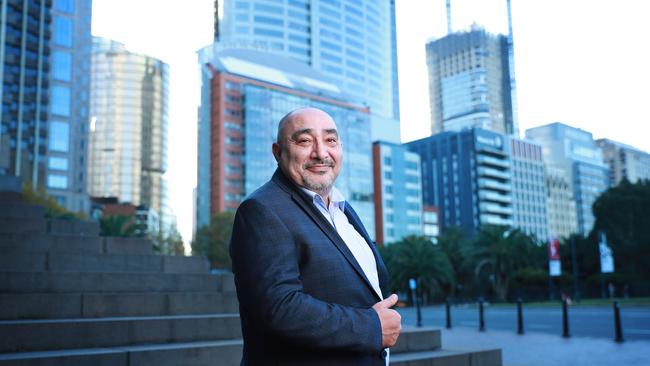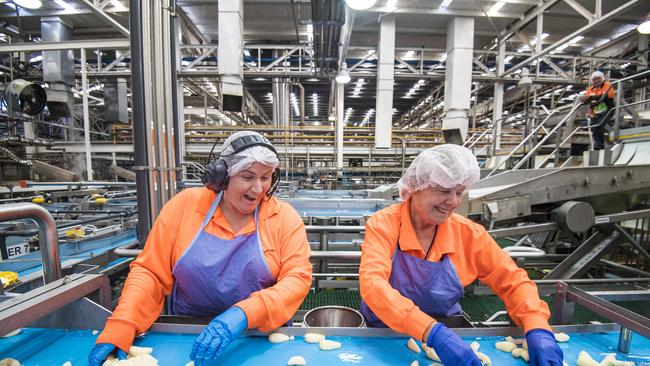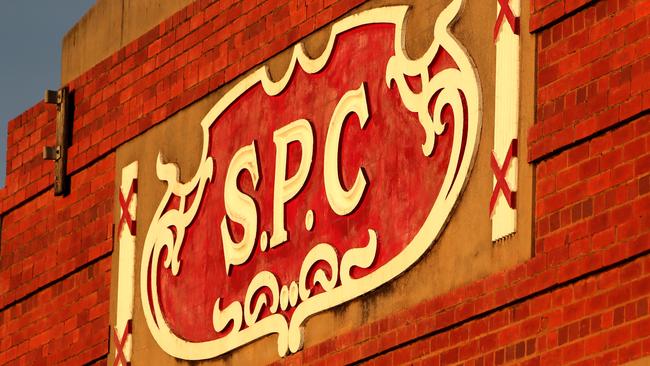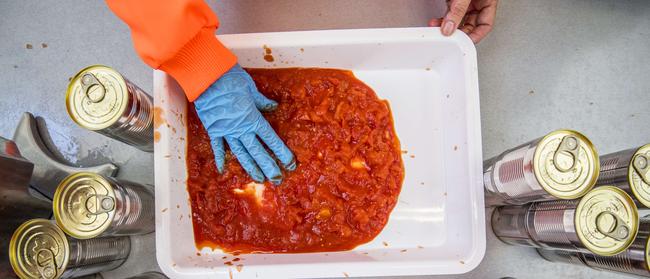How canny deal helped SPC thrive
The fruit and vegetable processor is now making profits again after Perpetuity and its partner invested $15m in the business.

It’s a 725km journey from the Macquarie Street offices of Perpetuity Capital in the heart of the Sydney CBD to the city of Shepparton on the floodplain of the Goulburn River in northern Victoria.
After the coronavirus-crisis-driven lockdown crippled air travel, two weeks ago Hussein Rifai and his wife Amanda took to the Hume Highway so the former Procter & Gamble and Johnson & Johnson executive could keep an eye on his latest plaything, the factory of the 100-year old fruit and vegetable processor SPC. But with all the hotels closed in Shepparton, the Rifais bunkered down at the Como Hotel in Melbourne’s formerly ritzy South Yarra — absent room service — and Hussein did day trips to the SPC factory.
“Talk about getting locked down in a hotel room and nothing open, so baked beans, sandwiches and fruit salad was the cuisine on offer,” he tells The Weekend Australian.
Rifai was largely unknown in Australian business circles before June last year when his Perpetuity Capital — which had previously invested in retailers, rubber recyclers, systems integrators and financial services companies — teamed with Sydney private equity firm The Eights in the Shepparton Partners Collective to pay $40m for the nation’s largest canned fruit and vegetables processing company.
It was a fraction of the $750m former owner Coca-Cola Amatil paid for SPC in 2005 and came after CCA slashed the value of SPC by $146m to zero in the months before the sale, after struggling to compete with supermarket home brands.
“With no disrespect to Coca-Cola, what we inherited was nothing short of neglect over 15 years. It was a big selling job to convince people of our vision to get them to join us, given SPC was viewed as a basket case in the industry,’’ Rifai, now SPC chairman, says bluntly.
A CCA spokeswoman told The Weekend Australian that the process to sell SPC came after CCA completed a $100m modernisation program, which meant the firm was well placed to expand its core portfolio and take on new categories and markets.
The two leaders appointed in August and September last year to lead the new SPC came from CCA’s old management team.
One Allan Findlay, who was named chief operating officer, was a 20-year Coke veteran.
New CEO Robert Giles was SPC’s former chief commercial officer.
But they were the only two of the old guard that remained.
“When private equity has traditionally bought businesses like SPC, all they have done is slash and burn. So it was challenging to convince people to come on board,’’ Rifai says.
“But we have been clear that we have a different agenda. So the first two layers of management we have in place now are almost completely new.”
Fast-forward 10 months and Rifai says SPC is now making profits again after Perpetuity — which manages its SPC investment through its wholly owned Perma Funds Management operation — and its partner have invested $15m in the business.

They’ve also sorted SPC’s working capital issues and assembled a capital war chest by securing low-interest borrowings through new debt partners and cash from the sale of the firm’s Kyabram factory, including the iconic brands of IXL jam and Taylor’s marinades and sauces, last October to the Kyabram Jam Company.
SPC now employs 1100 staff, including 100 redundant workers in the Shepparton area it took on at short notice in March to cope with record-breaking production runs at its plant flowing the coronavirus pandemic.
Rifai says sales of canned and packaged fruit, tomatoes, baked beans and spaghetti exploded on the back of supermarket panic-buying, forcing SPC to load product straight from production lines to trucks destined for supermarkets across the country.
That put the new management on a collision course with the Australian Manufacturing Workers’ Union (AMWU), which took protected industrial action in March amid drawn-out negotiations over a new enterprise bargaining agreement.

It prompted Robert Giles to call the union action “selfish and self-serving”, leaving customers ‘‘exposed’’ amid coronavirus panic.
The union hit back, calling Giles’ comments a “disgraceful attempt to play on current public fears about the coronavirus at the expense of workers trying to negotiate a fair deal”.
Rifai now says he wants a co-operative relationship with his workforce, with entrepreneurial staff central to the next stage of SPC’s transformation.
“Unions have been an issue and will be an issue for the future,’’ he says.
“We have viewed our union as partners. It is not just about the money you pay, it is about the flexibility of the work practices.”
He reiterates the vision he outlined last year to make SPC “the Nestle of Australia”.
“I would like this to be a multi-billion dollar agribusiness that sells value-added and innovative products around the world. I would like to have operations in different places around the world and be a significant player in that global food market,’’ he says.
“That means from here we need to achieve a fivefold increase in revenue, both organically and through acquisitions.”
Rifai and his partners are now targeting the Asia-Pacific and Europe, the Middle East and north Africa for growth, the latter through the acquisition of food businesses turning over at least €25m ($42.5m).
Turkey, Portugal and Spain are initially on the radar for deals. They are also looking at distributing SPC products into the UAE and Europe.
Back at home SPC is now also moving into a counter-seasonal mix of product varieties, away from its staple fruit, tomato and beans products.
Dates, jackfruit and pomegranates are being added to the portfolio, the later just last week through the purchase of the PomLife brand from Australian Pomegranate Growers.
SPC is also value-adding. Tomato sauce and frozen products are on the agenda, as are convenience meals using farmer beans and chick peas, extending the company’s traditional baked beans product range.

In early April SPC teamed up with the Chemist Warehouse-backed Australian baby milk formula dealer Wattle Health in a partnership designed to boost the marketing of Wattle's infant formula brands within SPC's distribution network, both domestically and internationally.
Rifai visited Wattle’s $55m organic milk spray drying plant currently under construction near Geelong during his recent Victorian sojourn.
Wattle has gone through a difficult year, hit by the double whammy of negative cash flow and heavy capital spending as it pursuit a dream to be a vertically integrated company.
A new CEO took over in January following the exit of co-founders Lazarus Karasavvidis and Martin Glenister.
For the time being Rifai says SPC will remain in private ownership but notes a return to the public market is inevitable. “I want to instil entrepreneurial instincts in my staff and that is best done in a private context,’’ he says.




To join the conversation, please log in. Don't have an account? Register
Join the conversation, you are commenting as Logout